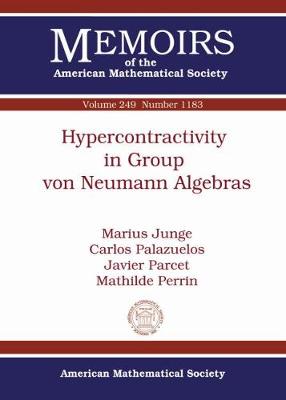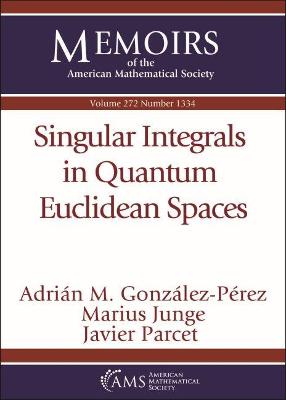Memoirs of the American Mathematical Society
2 total works
Hypercontractivity in Group von Neumann Algebras
by Marius Junge, Carlos Palazuelos, Javier Parcet, and Mathilde Perrin
Published 1 September 2017
In this paper, the authors provide a combinatorial/numerical method to establish new hypercontractivity estimates in group von Neumann algebras. They illustrate their method with free groups, triangular groups and finite cyclic groups, for which they obtain optimal time hypercontractive $L_2 \to L_q$ inequalities with respect to the Markov process given by the word length and with $q$ an even integer. Interpolation and differentiation also yield general $L_p \to L_q$ hypercontrativity for $1 p \le q \infty$ via logarithmic Sobolev inequalities. The authors' method admits further applications to other discrete groups without small loops as far as the numerical part--which varies from one group to another--is implemented and tested on a computer.
The authors also develop another combinatorial method which does not rely on computational estimates and provides (non-optimal) $L_p \to L_q$ hypercontractive inequalities for a larger class of groups/lengths, including any finitely generated group equipped with a conditionally negative word length, like infinite Coxeter groups. The authors' second method also yields hypercontractivity bounds for groups admitting a finite dimensional proper cocycle. Hypercontractivity fails for conditionally negative lengths in groups satisfying Kazhdan's property (T).
The authors also develop another combinatorial method which does not rely on computational estimates and provides (non-optimal) $L_p \to L_q$ hypercontractive inequalities for a larger class of groups/lengths, including any finitely generated group equipped with a conditionally negative word length, like infinite Coxeter groups. The authors' second method also yields hypercontractivity bounds for groups admitting a finite dimensional proper cocycle. Hypercontractivity fails for conditionally negative lengths in groups satisfying Kazhdan's property (T).
Singular Integrals in Quantum Euclidean Spaces
by Adrian M. Gonzalez-Perez, Marius Junge, and Javier Parcet
Published 1 May 2022
We shall establish the core of singular integral theory and pseudodifferential calculus over the archetypal algebras of noncommutative geometry: quantum forms of Euclidean spaces and tori. Our results go beyond Connes' pseudodifferential calculus for rotation algebras, thanks to a new form of Calder´on-Zygmund theory over these spaces which crucially incorporates nonconvolution kernels. We deduce Lp-boundedness and Sobolev p-estimates for regular, exotic and forbidden symbols in the expected ranks. In the L2 level both Calder´on-Vaillancourt and Bourdaud theorems for exotic and forbidden symbols are also generalized to the quantum setting. As a basic application of our methods, we prove Lp-regularity of solutions for elliptic PDEs.

